Business & Management
ECRLF Helping to Co-create the Future of African Academic Leadership
Published
4 years agoon
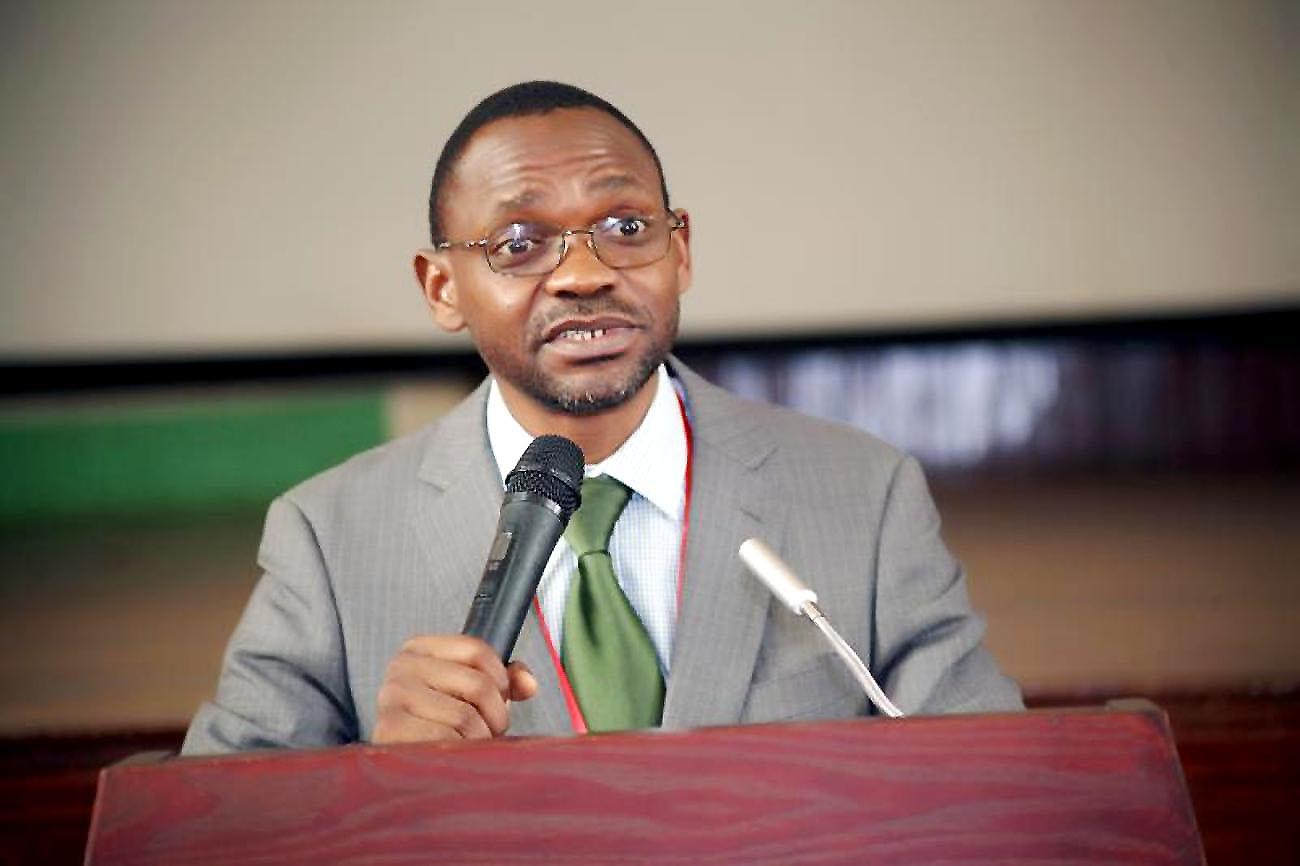
Makerere University in partnership with University of Pretoria on 14th September 2021 hosted the Future Africa’s Early Career Research Leader Fellowship (ECRLF) Dissemination Workshop in the Central Teaching Facility 2 (CTF 2) Auditorium and virtually. ECRLF’s aim is to offer an opportunity for development of research leaders who will be able to fill a critical gap in the African research capacity ecosystem. This fellowship program is offered by the University of Pretoria with support from the Carnegie Corporation of New York.
The Principal Investigator (PI) of the ECRLF program at Makerere University and Lecturer in the Department of Population Studies, Dr. John A. Mushomi, thanked Future Africa for the first-of-its-kind fellowship accorded to young African academics.
“We are used to taking leave from academia at a much later time in life, where we have professors taking their sabbaticals, but within five years of finishing my doctorate, I was given an opportunity to spend two years at the University of Pretoria and interact with academics from across different disciplines and universities in Africa” explained Dr. Mushomi.
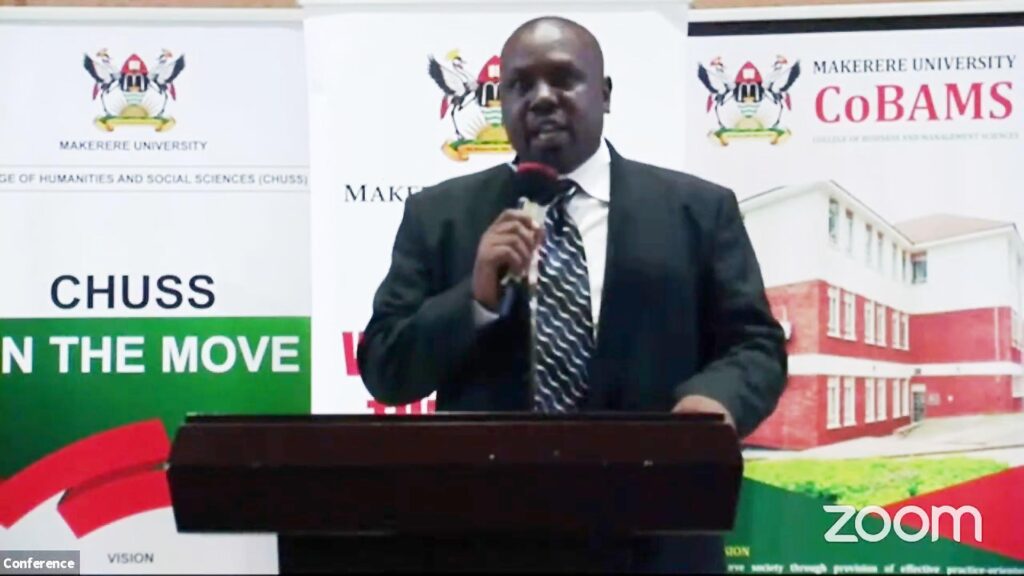
In this respect, he thanked the Carnegie Corporation of New York for sponsoring the ECRLF and the University of Pretoria for hosting the fellowship. He equally thanked Dr. Cori Wielenga from the University of Pretoria for the mentorship accorded to him during the fellowship.
“We had the opportunity to interact with fifteen researchers from different disciplines and spent time learning and training together, and we have not been the same since. We were not just invited to participate but to also co-create what we think is the future of African academic leadership” added Dr. Mushomi.
Speaking on behalf of Future Africa, Rachel Fischer said, “In particular we see with this conference today our very important objective to work with a transdisciplinary mindset and engagement towards forming partnerships, and to collaborate across various disciplines.”
She added that the shift from physical to virtual and online collaboration is an active endeavour towards breaking down silos within disciplines, partnerships as well as across various countries on the African continent. The outcomes from such partnerships, she noted, would allow all stakeholders to have a peaceful and secure Africa that is stable and fully functional, while ensuring that the values and ideals of Africa are prioritised.
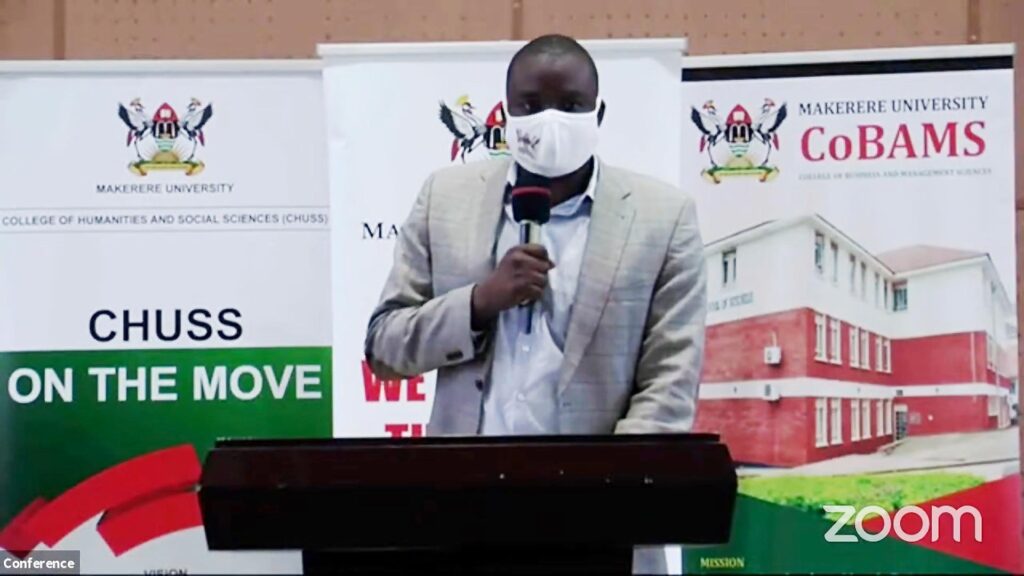
The Dean, School of Statistics and Planning (SSP), Dr. James Wokadala, who was represented by the Head, Department of Population Studies, Dr. Stephen Wandera noted in his remarks that SSP encourages staff to go beyond conducting research and publishing to mentoring students into the next generation of African academics by co-publishing with them.
In line with the workshop he thanked the University of Pretoria for the partnership, noting that “collaboration among African academics helps us to build more comparative studies across the continent, allowing colleagues to learn from each other the best practices and opportunities that can move us forward.”
He congratulated Dr. John Mushomi upon completing his post-doctoral research experience at UP, which culminated into the exciting workshop.
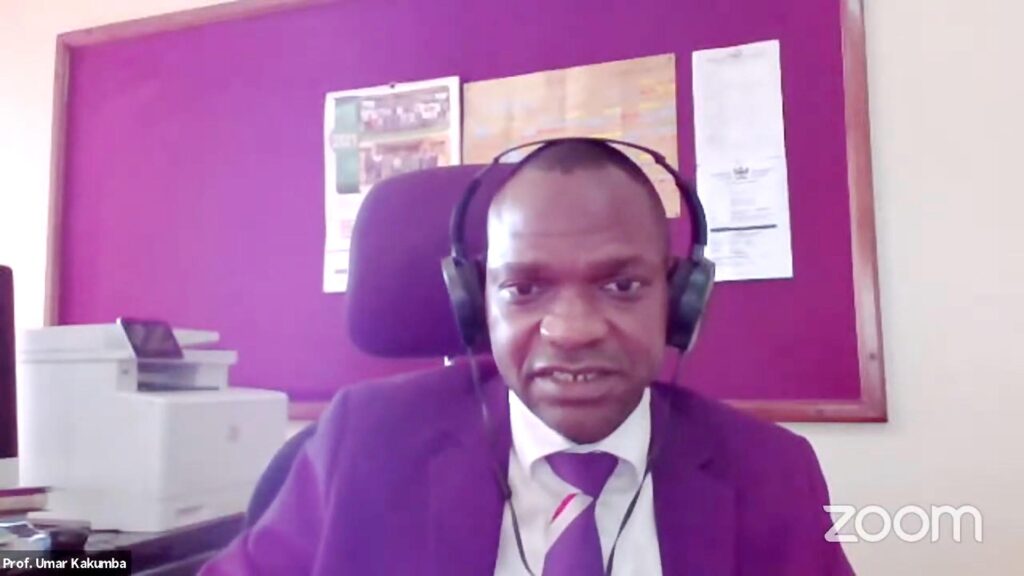
Officially opening the workshop, the Deputy Vice Chancellor (Academic Affairs)-DVCAA, Dr. Umar Kakumba applauded the University of Pretoria supported by the Carnegie Corporation of New York for the great capacity development for future academia and African leaders. The workshop was based on the theme, History Meets Demography: Multi-Disciplinary Inquiry on Poverty, Resource.
“I applaud the University of Pretoria on this move and demonstrating the great potential that Africa has, especially the academic institutions, in mobilising resources, bringing together the African scholars and giving them an opportunity to explore and forge South-to-South collaboration” remarked Dr. Kakumba.
He added that South-to-South collaborations help to build a solid academia across the continent, enabling them to find solutions to emerging problems of African societies. The DVCAA noted that COVID-19 had brought to light the vulnerability of Africa’s dependence on the global North to solve her fundamental problems as well as the greater role that universities ought to play.
“And we cannot play this role as Universities outside the shadows of partnerships between our institutions, and without building the huge capacity of early career researchers” he observed.
The DVCAA therefore noted that workshop’s theme and its concerns about issues of history and demography were source of great hope, especially given its transdisciplinary nature.
“We are able to dialogue on history and demography and see how we can address issues of poverty in light of our past experiences as well as interrogate the nature of our population and the characteristics that affect our society in various ways” he stated.
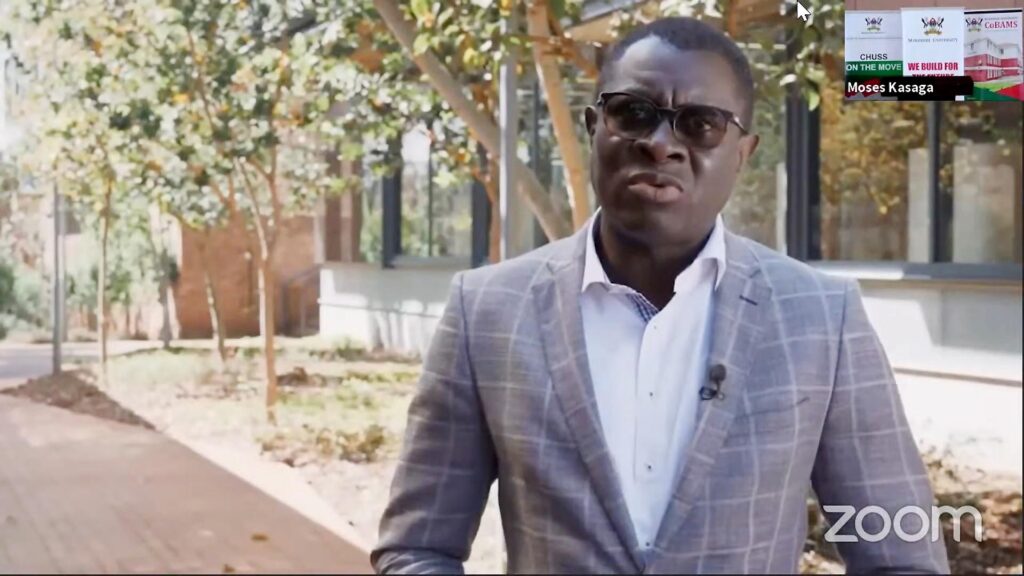
In his welcome message, Prof. Cheikh Mbow, Future Africa Director at the University of Pretoria noted that his organization had over the years been holding academic workshops on different topics across different African countries.
“The reason why were are trying to empower the early career scientists is actually to be able to close the loop in terms of availing science in order to package and deliver knowledge to everyone who needs it, particularly the stakeholders.
“Today’s topic is very timely. It’s about poverty in Africa, it’s about resources in Africa, and it’s about mobility in Africa. The poverty line which had come to be stable at some point or decreasing quite slowly over the projected years to come has just suddenly gone into a spike – Africa now has more than 50 million new poor people coming into the statistics of the World Bank” remarked Prof. Mbow.
He concluded by noting that research is not only about hardcore science but looking at all other aspects of life as contributors to knowledge production. “The transdiciplinary theme of the workshop is one of the most important discussions that ECRLF could have.”
The workshop featured four parallel sessions that covered;
- Governance, Security, Peace and Conflict I
- Mining, Resource, Extraction and Policy frameworks
- Global Trends in Interdisciplinary Research and Governance, Security, Peace and Conflict II and
- Education and Development and Resource extraction and Policy frameworks II
During the closing ceremony, Dr. Cori Wielenga on behalf of ECRLF thanked participants for the wonderful conference proceedings as fostered by Dr. Mushomi’s involvement with the University of Pretoria.
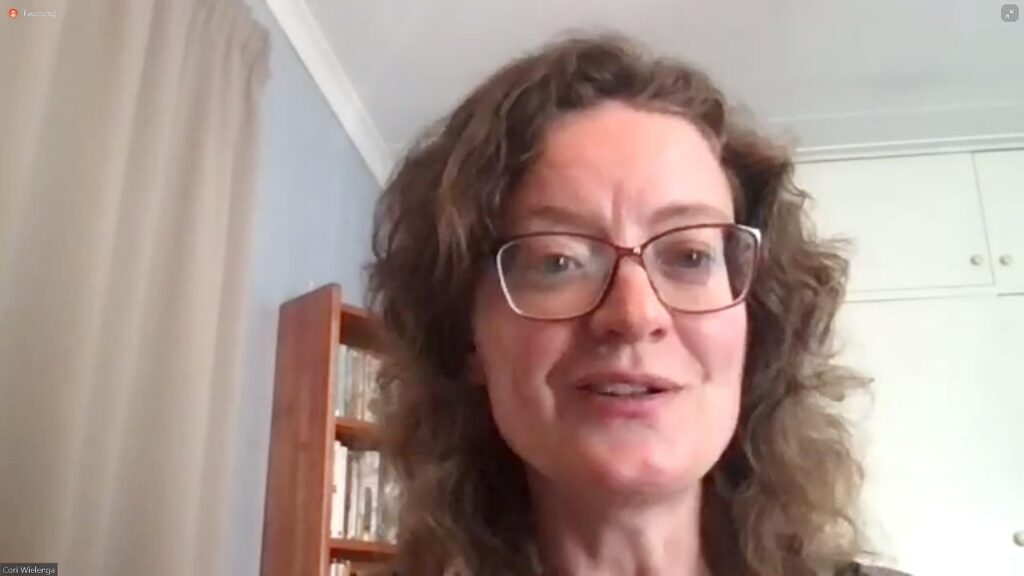
“The purpose of this fellowship and its collaboration is to promote interdisciplinary research as well as collaboration between institutions on the continent and in this regard Dr. Mushomi has made excellent use of the fellowship to meet its objectives including through this conference” she elaborated.
The program mentor from UP added that her collaborative work with Dr. Mushomi was particularly in the areas of resources, identity and migration, which remain a challenge to Africa and the entire globe.
Dr. Wielanga thanked Makerere University for supporting the event, and Dr. Mushomi as well as the coordination team for organizing a successful hybrid event. “We do hope that we will be able to meet in person in the near future as we deepen the collaboration between our institutions.”
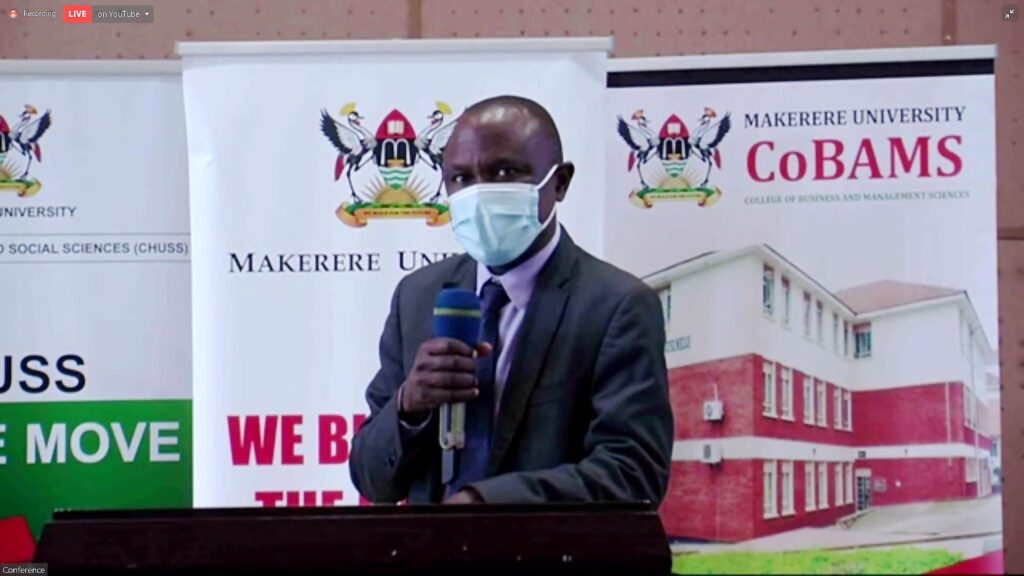
Addressing participants, the Principal, College of Business and Management Sciences (CoBAMS), Dr. Eria Hisali congratulated Dr. Mushomi upon successfully convening the hybrid workshop and extended his appreciation to the funding partners for supporting both the event and work of early career researchers.
In terms of providing sustainability to the collaboration, Dr. Hisali appealed to all the partners to regard the day’s workshop as a starting point and work towards strengthening their collaborations so that a lot more work can be done in other fields of research.
He equally appealed to the collaborating parties to use the findings generated thus far to engage policy makers, civil society and the private sector under a framework of policy labs, at least once every quarter. The Principal further called for the integration of students into research activities, as a way of creating multiplier effects that can continue to inform policy debates.
“As the College of Business and Mangement Sciences, we commit that out of our small grants research programme, we should be able to take up funding to further studies in some of these areas” concluded Dr. Hisali.
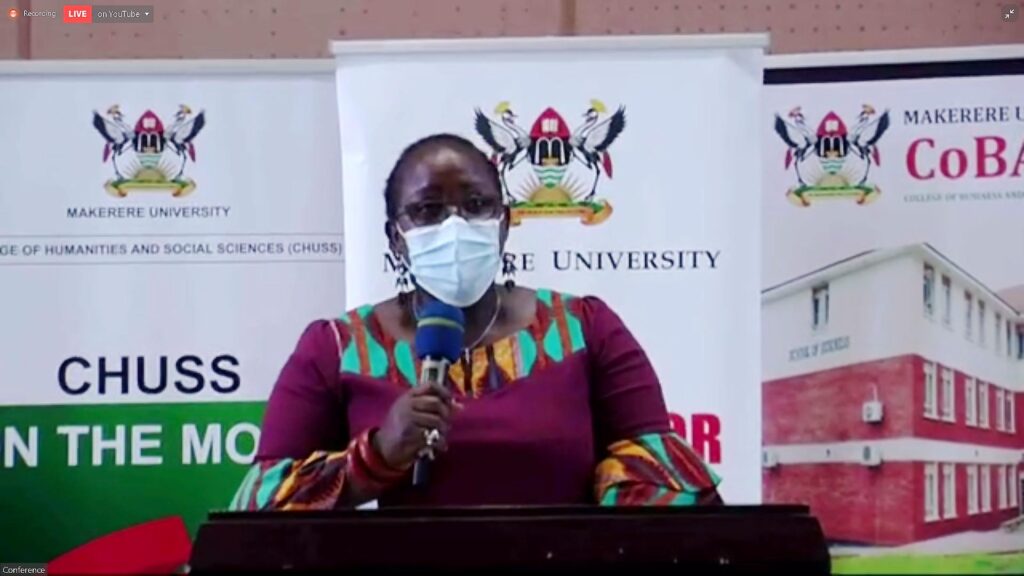
Delivering the closing remarks, the Principal College of Humanities and Social Sciences (CHUSS), Dr. Josephine Ahikire noted that interdisciplinarity increases the University’s relevance to society by bringing forth perspectives that enrich the understanding what is at stake in terms of development challenges.
“It is very exciting that we are re-centering history as a key perspective in whatever we do as a university. We know that in the past decade, history had been relegated as a study of the past but actually, history is not just a study of the past, it is the understanding of the totality of humanity for you to be able to actually craft a way forward” Dr. Ahikire explained.
The Principal noted that resource conflicts and contestations are at the heart of human existence. As such, she opined that issues such as citizenship, tribe and nation were very important and the workshop had commendably provided a space where early career researchers can try to provide answers to questions of the time on the African continent.
“A research-led university is one where the people engage intellectually. These engagements improve the academic environment for staff as well as students” she concluded.
The abstracts and presentations from the workshop will contribute to an edited book to be published by Palgrave.
Please click the embedded video below to view proceedings from the Workshop
Opening Session
Session 1A: Governance, Security, Peace and Conflict I
Session 2A: Global Trends in Interdisciplinary Research and Governance, Security, Peace and Conflict II
Closing Ceremony
You may like
-
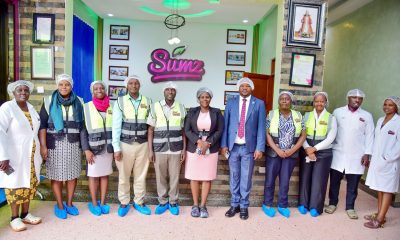

Makerere Explores Strategic Industry Partnership with Psalms Food Industries to Strengthen Manufacturing Innovation
-


Makerere Graduation Underscores Investment in Africa’s Public Health Capacity
-
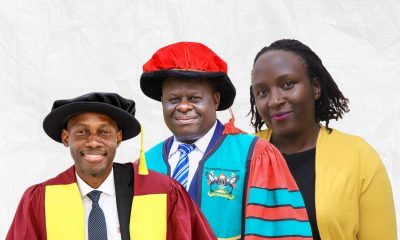

Three MakSPH Faculty Honoured with Makerere University Research Excellence Awards 2026
-


Makerere University commemorates 13 transformative years of partnership with Mastercard Foundation
-


Mak News Magazine: February 2026
-
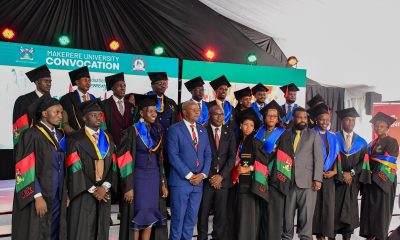

76th Graduation Ceremony: CoBAMS Staff and Graduates Win Excellence Awards
Business & Management
Thirty Public Officers Certified in Integrated Regulatory Cost-Benefit Analysis
Published
1 day agoon
March 3, 2026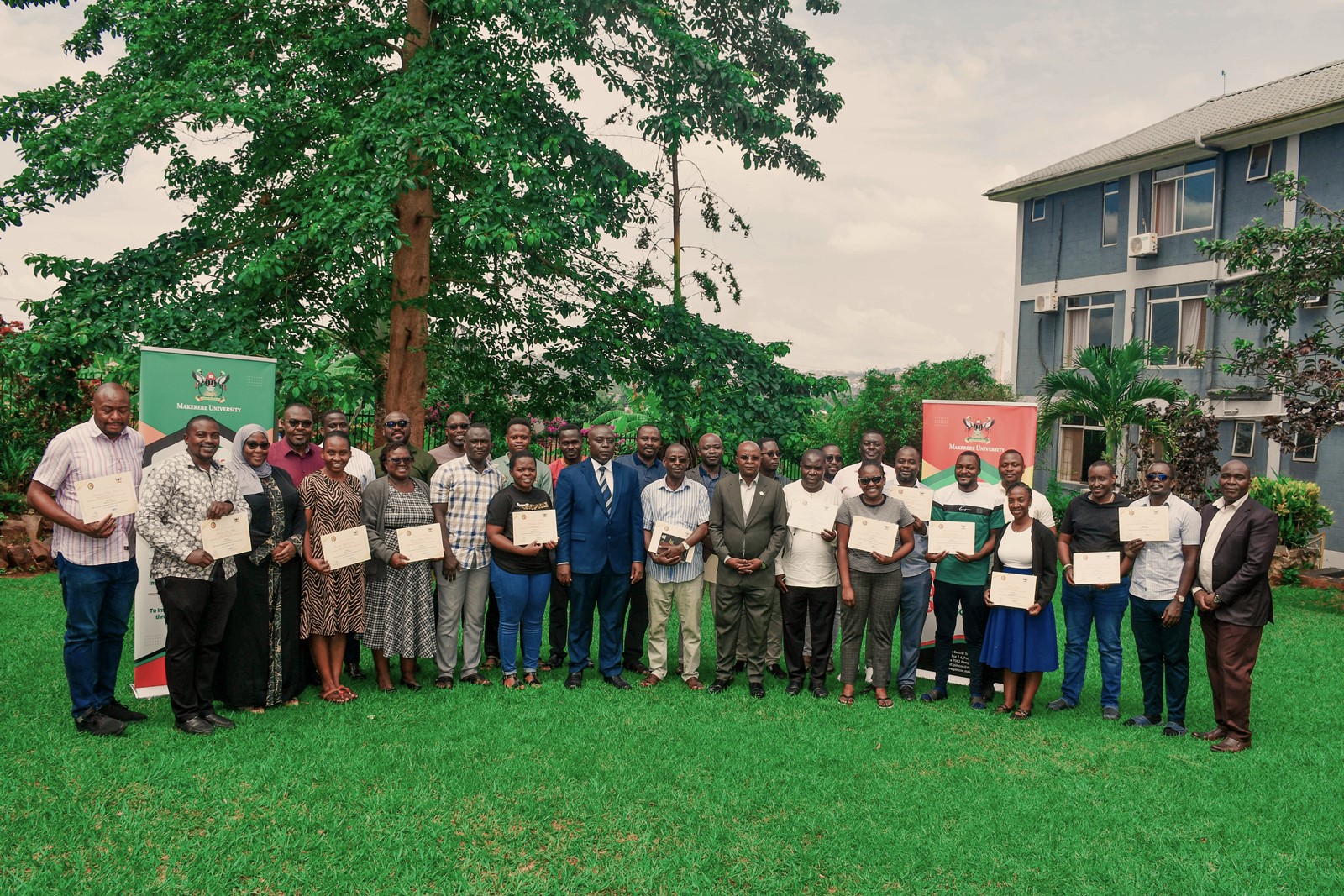
Thirty public officers from various Ministries, Departments and Agencies (MDAs) have successfully completed a two-week intensive training in Integrated Regulatory Cost-Benefit Analysis (IRCBA), culminating in the award of certificates at a closing ceremony held on 27th February 2026 at the Pearl on the Nile Hotel in Jinja.
The training was jointly organized by the Public Investment Management Centre of Excellence at Makerere University and the Ministry of Finance, Planning and Economic Development (MoFPED), in collaboration with the Infrastructure and Social Services Department (ISSD) and the National Planning Authority (NPA). It focused on operationalizing the Revised Guidelines for the Issuance of Certificates of Financial Implication (CFIs), which came into effect on 1st July 2025.
A Strategic Reform for Fiscal Credibility
In closing remarks delivered on by Commissioner Paul Patrick Mwanja behalf of the Permanent Secretary/Secretary to the Treasury, participants were commended for undertaking the training during a demanding budget cycle, when many MDAs are simultaneously preparing the FY 2026/27 Budget, executing the FY 2025/26 Budget, and implementing the National Development Plan IV and the Tenfold Growth Strategy.
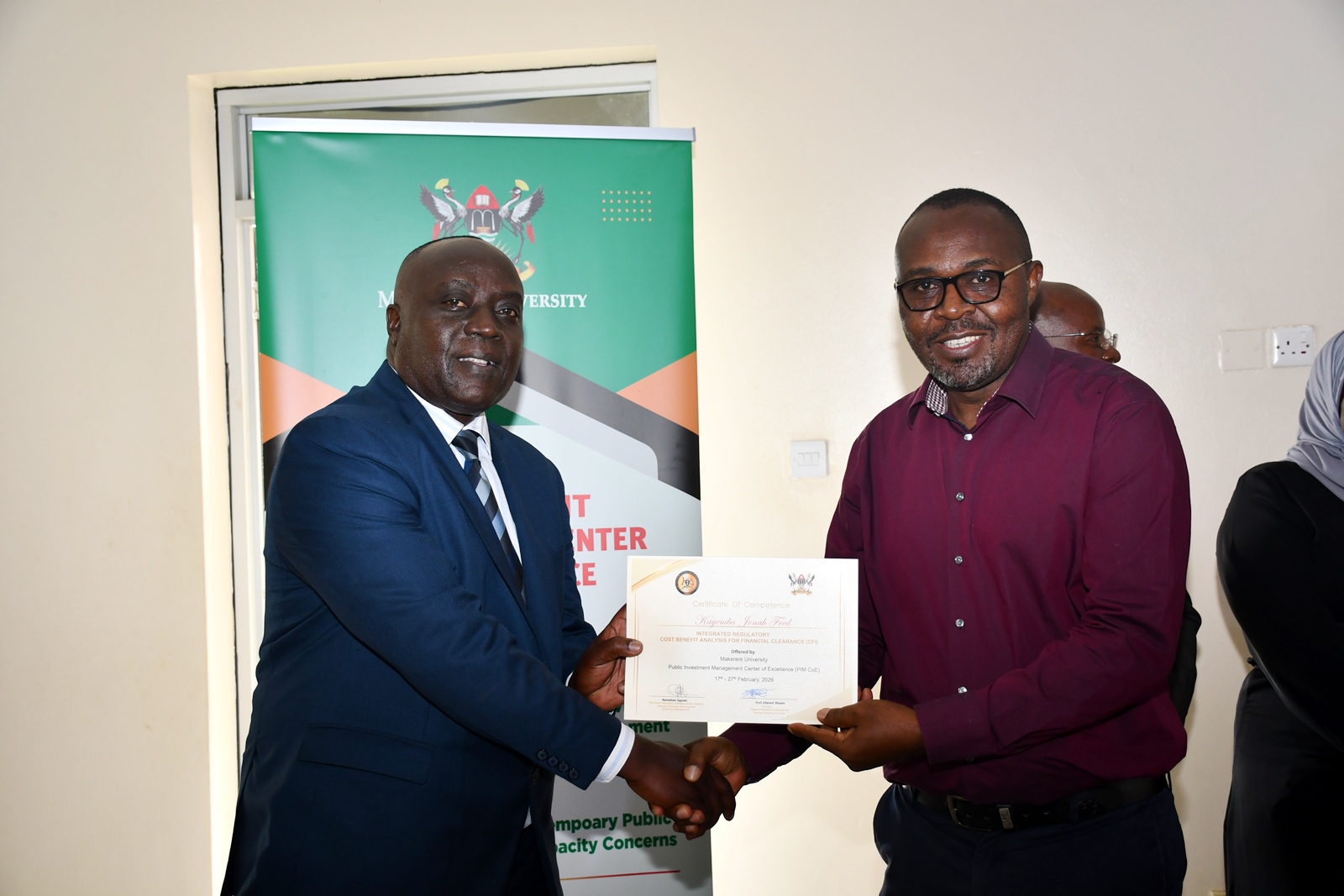
The PS/ST emphasized that the revised Guidelines mark a significant shift toward a more transparent, data-driven, consultative, and analytically rigorous approach to evaluating policy and legislative proposals. Participants were equipped to assess fiscal implications, evaluate economic and socio-economic impacts, analyze distributional effects, and address uncertainty using structured analytical tools.
They were reminded that training alone is not sufficient, the real test lies in consistent application. As members of the third cohort, they were challenged to serve as reform ambassadors, championing evidence-based policymaking and strengthening analytical standards across government.
Bridging Academia and Public Service
Delivering the official closing remarks, the Director of the PIM Centre of Excellence, Prof. Edward Bbaale, commended participants for their active engagement and unwavering commitment throughout the training.
He described the programme as both timely and strategic, designed to equip officers with practical tools to prepare robust Statements of Financial Implication (SFIs) that support credible issuance of CFIs. He noted that strong financial analysis enhances fiscal discipline, policy coherence, and the overall quality of legislation and public policy in Uganda.
Prof. Bbaale underscored the longstanding partnership between Makerere University and the Ministry of Finance, highlighting how it continues to bridge academia and public service by combining analytical rigor with practical policy experience. He emphasized that the collaborative model — bringing together faculty from the College of Business and Management Sciences and practitioners from Government, reflects the core vision of the PIM Centre of Excellence: strengthening national systems through evidence-based policymaking.
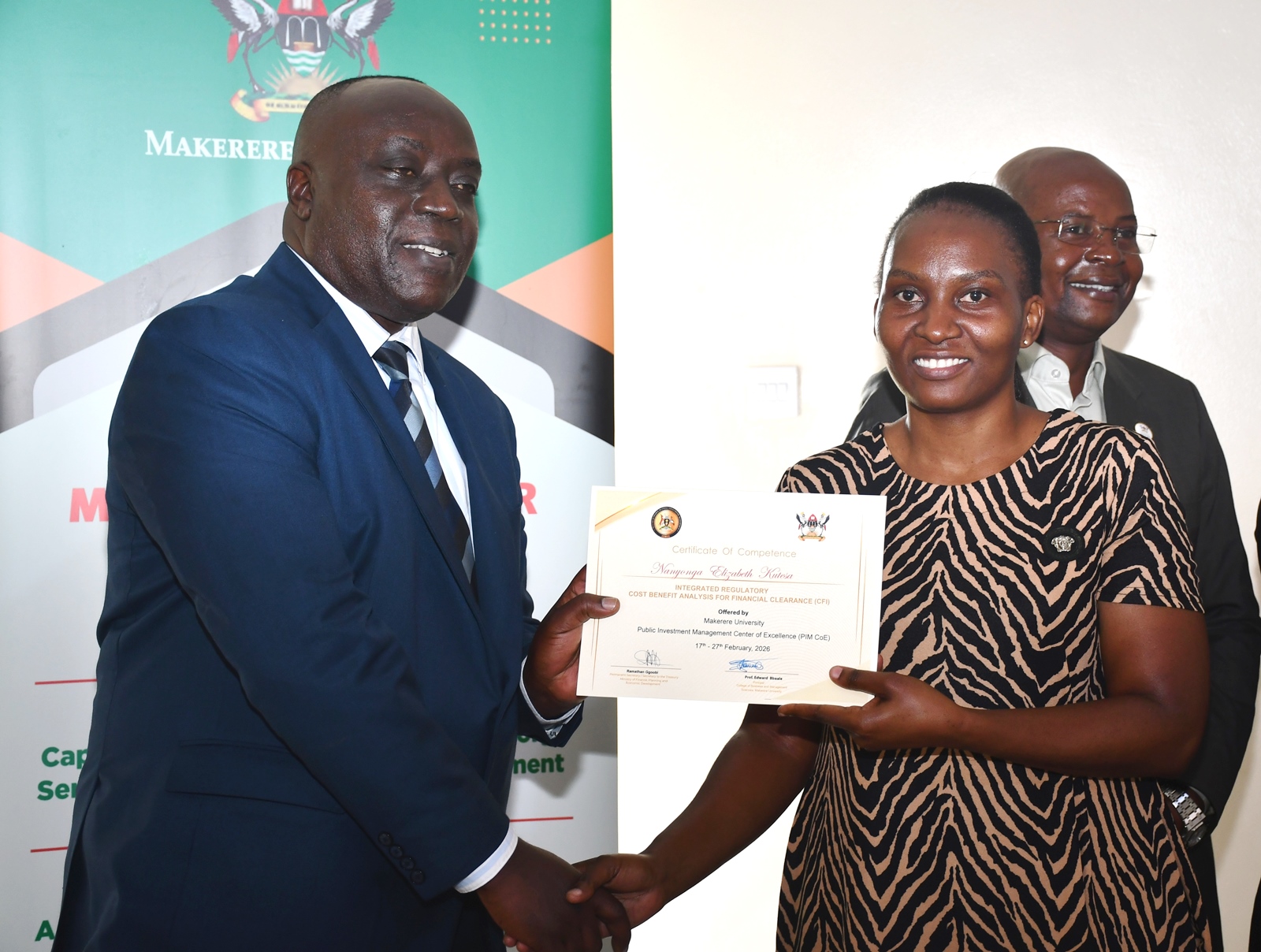
During the two weeks, participants gained hands-on experience in applying cost-benefit analysis across four critical dimensions: budgetary analysis, socio-economic analysis, distributive impacts, and risk assessment. Prof. Bbaale encouraged them to return to their institutions as agents of transformation, improving evaluation frameworks, strengthening regulatory decisions, and ensuring that public interventions deliver value for money and long-term development impact.
He also reaffirmed the Centre’s broader mandate beyond training, noting its recent support to the revision of Development Committee Guidelines, assessment of public investment performance since NDP I, and hosting of the Second Public Investment Management Conference in August 2025.”
Building from “Zero Kilometre”
Earlier, the Manager of the PIM Centre of Excellence highlighted the practical approach adopted during the training. Participants began with blank Excel sheets and built analytical models from scratch, likened to the engineering concept of starting at “zero kilometre,” where construction begins from the very starting point and progresses step by step.
The interactive sessions enabled participants from diverse disciplines, including policy analysts, planners and statisticians, to interrogate assumptions, refine costing approaches, and debate implementation and enforcement frameworks. Their sector-specific insights enriched the learning process and strengthened the analytical models developed.
The Manager noted that excellence is not about knowing everything, but about bringing together the right expertise. Facilitators from MoFPED, NPA, the Office of the President, and Makerere University ensured that theory remained grounded in practical government realities.
Participants Applaud Practical and Engaging Sessions
Speaking on behalf of the cohort, a participant described the training as highly engaging and transformative. The combination of theory and practical application, coupled with patient facilitation, allowed officers from varied professional backgrounds to learn from one another.
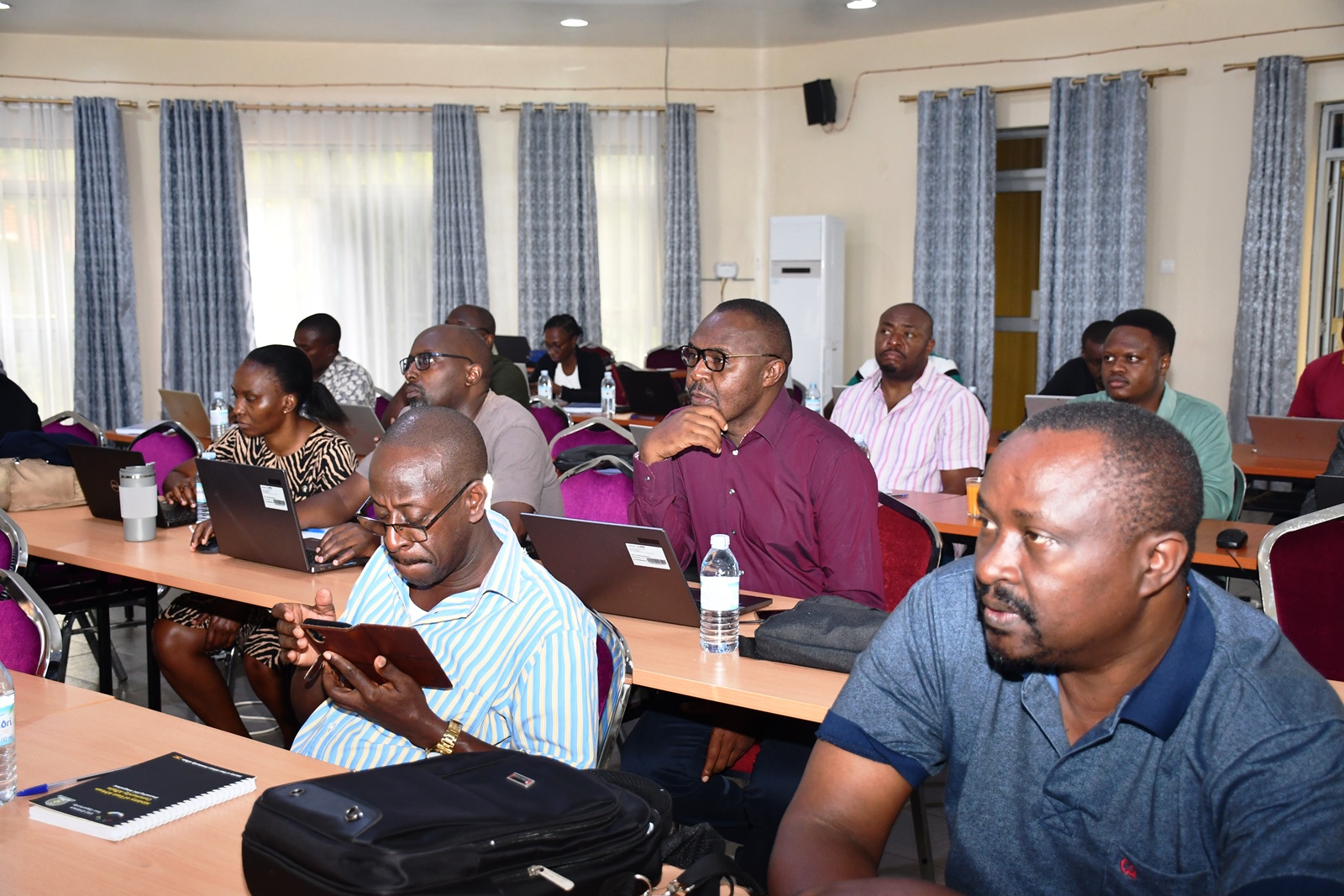
The participant highlighted the final day’s discussions as the most impactful, expressing confidence that the knowledge gained would enhance policy analysis and improve the quality of programmes and projects across MDAs.
Certificates Awarded
The ceremony concluded with the award of certificates to all 30 participants in recognition of their successful completion of the IRCBA training. The certification marks another milestone in Government’s effort to build a critical mass of experts capable of institutionalizing rigorous financial and economic analysis in public policy processes.
As the workshop was formally declared closed, participants were encouraged to apply their newly acquired skills consistently, mentor colleagues, and contribute to strengthening fiscal governance across Government.
The PIM Centre of Excellence reaffirmed its commitment to continuous research, policy advisory support, and capacity building as Uganda advances toward more credible, transparent, and sustainable public decision-making.
Business & Management
Botswana Delegation Visits Makerere’s Public Investment Management Centre to Study Sustainable Training Model
Published
1 day agoon
March 3, 2026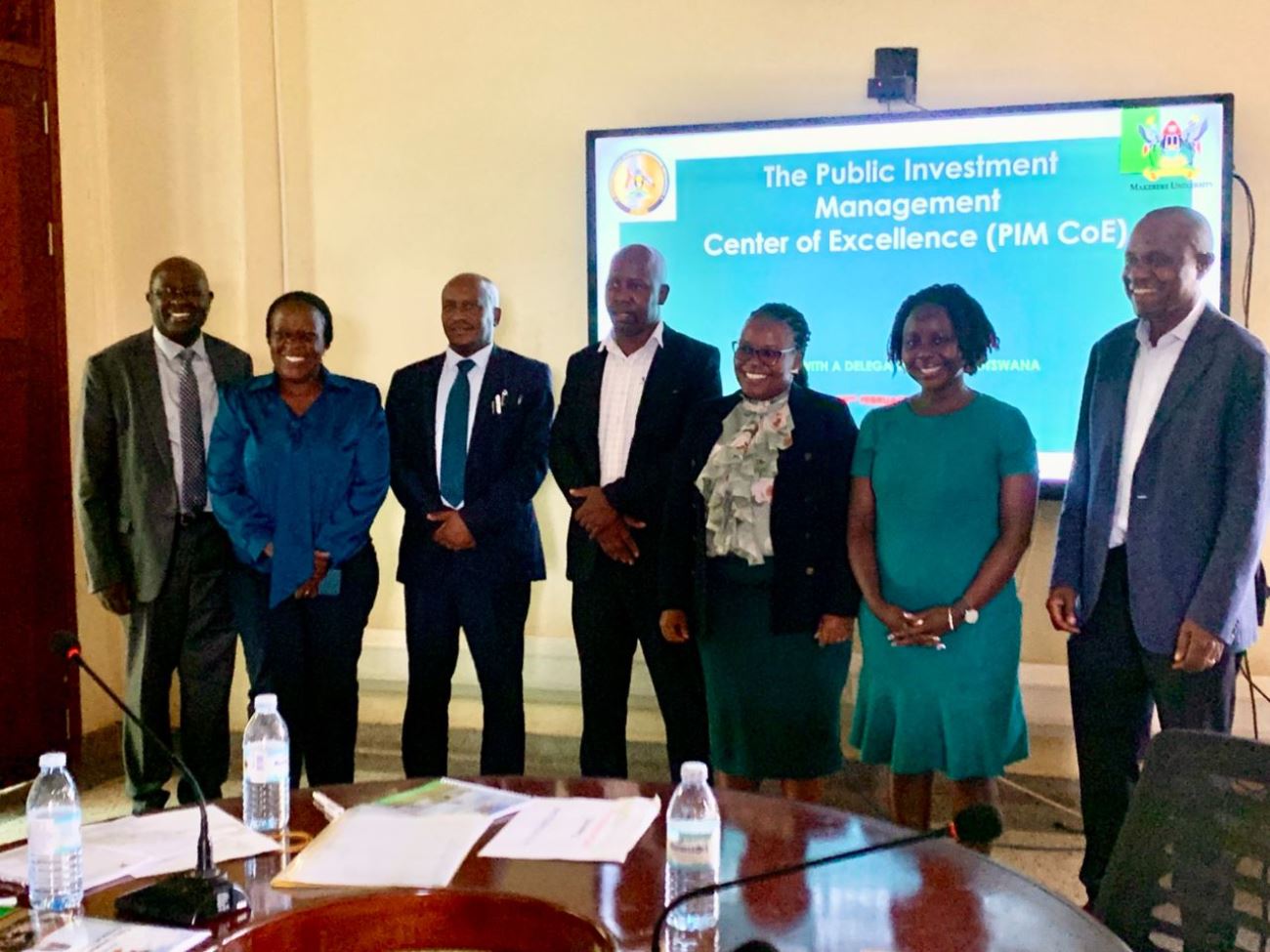
Kampala, Uganda – 25 February 2026
A delegation from Botswana’s public investments sector on 25th February 2026 visited Makerere University’s Public Investment Management Centre of Excellence to benchmark its sustainable training model and draw lessons from Uganda’s well-established Public Investment Management (PIM) framework.
The team, composed of specialists in public investments, is exploring ways to strengthen capacity within Botswana’s public sector institutions. The delegation underscored the importance of structured and sustainable capacity-building programmes, noting that effective public investment management is central to driving national development and ensuring value for money in public projects.
During the engagement, the Botswana team sought to understand the Centre’s operational model, including how it designs and delivers training programmes that remain impactful over time. Particular interest was placed on the Centre’s approach to sustainable training delivery, the documentation of challenges and successes, and mechanisms used to ensure that public officers acquire long-term, practical skills that translate into improved project planning, appraisal, and implementation.
The visiting delegation commended Uganda’s commitment to institutionalizing PIM training and emphasized that cross-country learning is vital for strengthening public financial management systems across Africa. They observed that Uganda’s experience offers practical insights into building a resilient and responsive PIM framework anchored in continuous professional development.
As part of their recommendations, the delegation proposed the introduction of a hybrid training model to enhance accessibility for international participants. Under this approach, the theoretical components of PIM courses would be delivered online, allowing participants to engage remotely from Botswana and other countries. This would then be followed by in-person sessions in Uganda focused on hands-on, experiential learning at the Centre.
According to the delegation, such a model would significantly reduce travel costs and time while preserving the value of face-to-face practical training. The hybrid approach would also provide flexibility for busy public officers, enabling them to balance professional responsibilities with structured learning.
The visit further strengthened regional collaboration and reaffirmed the role of Uganda’s Public Investment Management Centre of Excellence as a hub for capacity development in public investment management across the continent.
Business & Management
76th Graduation Ceremony: CoBAMS Staff and Graduates Win Excellence Awards
Published
6 days agoon
February 26, 2026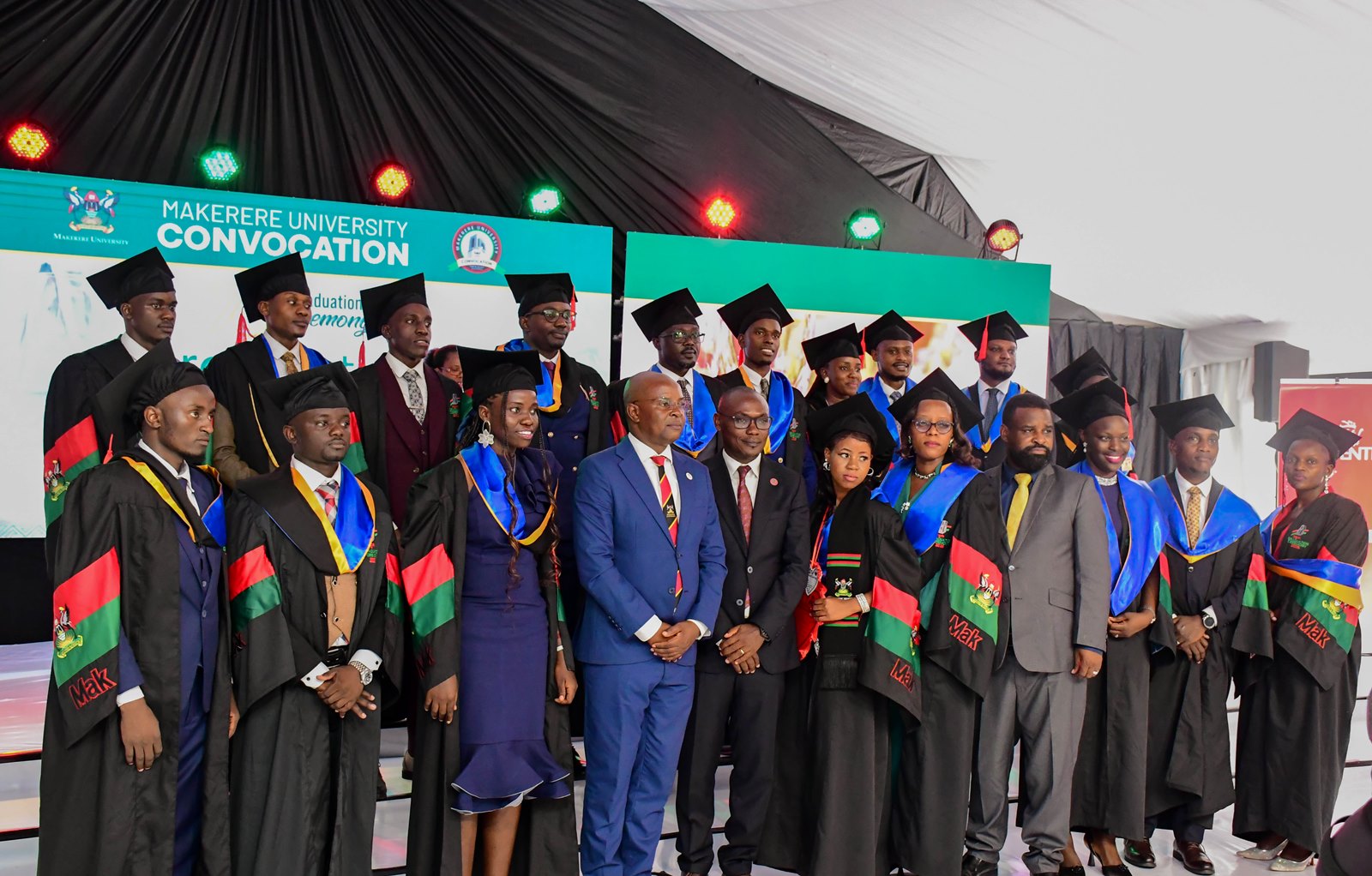
26th February 2026-During the 76th Graduation Ceremony (24th to 27th February 2026), Makerere University invoked its tradition of recognizing outstanding performance and excellence in academics, research, teaching, knowledge transfer, publication and authorship.
The College of Business and Management Sciences (CoBAMS) presented students for graduation on the third day of the 76th graduation ceremony. Consequently, on 26th February 2026, entities within the University namely the Office of the Vice Chancellor, Makerere University Press, the Directorate of Research, Innovations and Partnerships, Directorate of Graduate Training, and partners including the Economic Policy and Research Centre (EPRC), Association of Chartered Certified Accountants (ACCA Uganda), Prudential Uganda, lined up awards, to celebrate achievements and excellence.
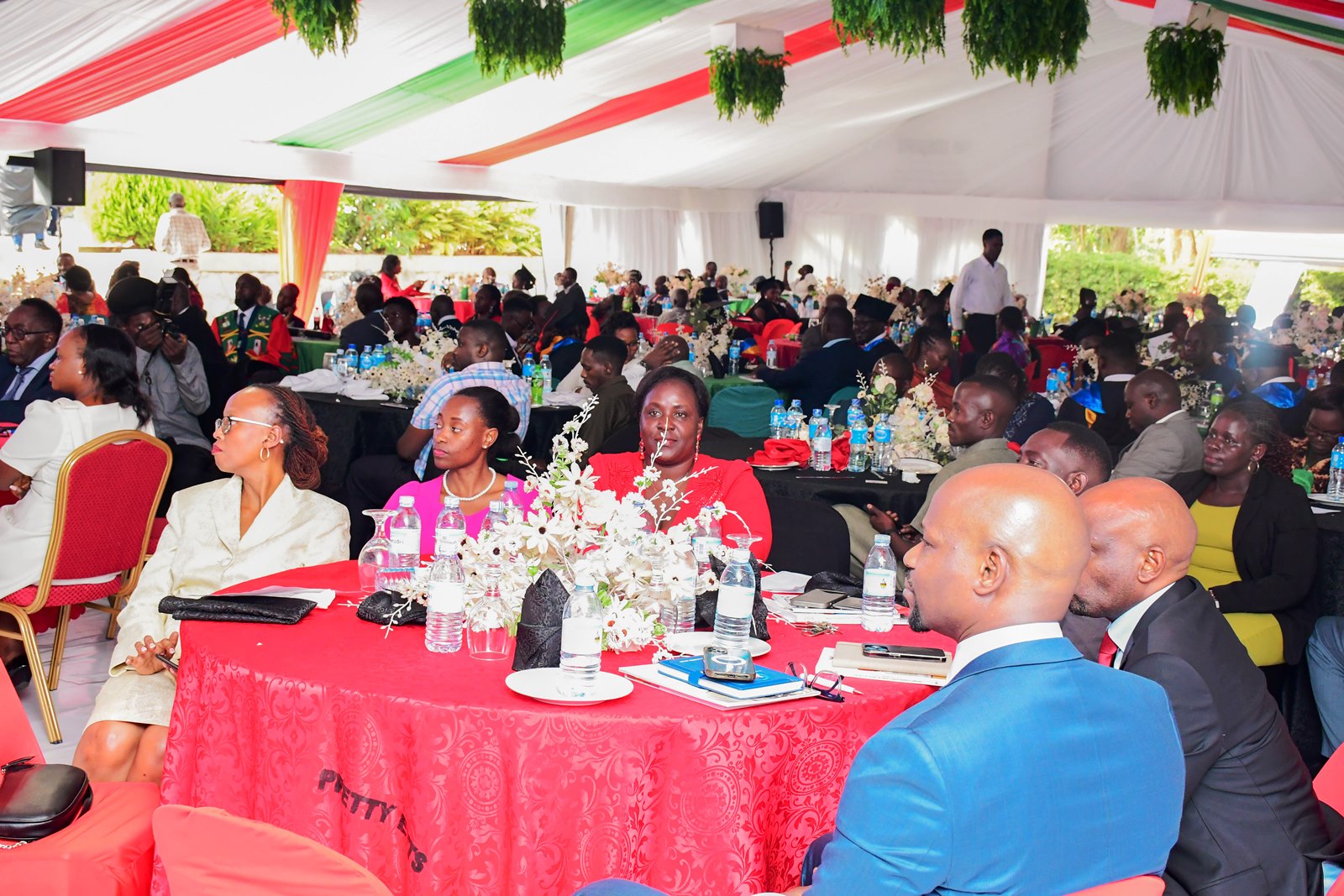
The award ceremony brought onboard invited guests from public and private sectors, the business community, Makerere University officials, faculty members, alumni, industry partners and graduating students. The awards were presented during the Makerere University Convocation Graduation Luncheon.
The ceremony provided a platform for celebrating academic excellence, strengthening alumni engagement, and reinforcing collaboration between the University and its professional and industry partners.
2026 Research Excellence Awards
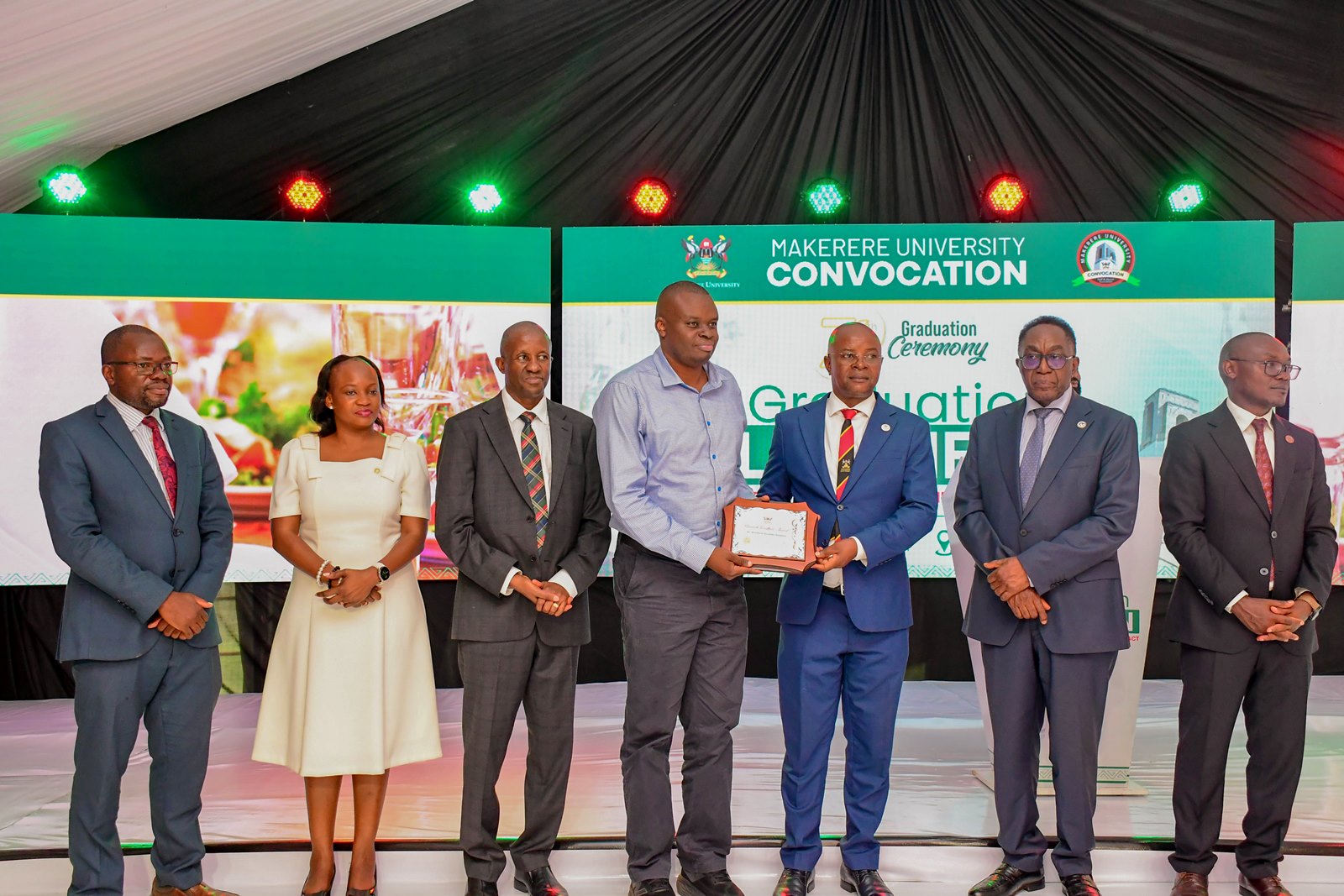
The Vice Chancellor’s Research Excellence Awards were presented to college members whose research output and scholarly contributions have significantly advanced knowledge and strengthened the College’s academic profile.
At CoBAMS, the recipients of the Vice Chancellor’s Research Excellence Awards in the various categories included the following:
- Associate Professor Faisal Buyinza, Overall top research award
- Associate Professor Faisal Buyinza, Senior-Career Research award
- Stephen Ojiambo Wandera, Mid-Career Research award
- Ruth Mpirirwe and Richard Ssempala, Early-Career Research award
The awardees were honored for their exceptional research productivity, impactful publications, and contribution to building a vibrant research culture.
The awards underscore Makerere University’s emphasis on high-quality research that addresses national and global development challenges.
Recognition of Book Author
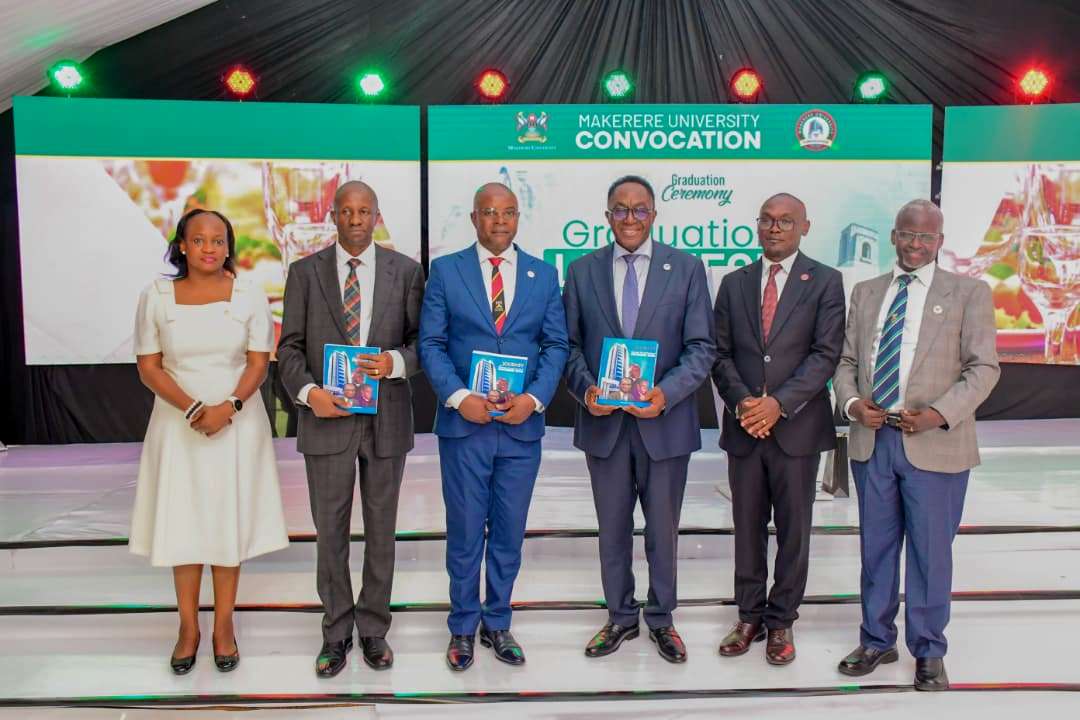
Prof. John Ddumba-Ssentamu, a renowned economist, administrator, former Vice Chancellor of Makerere University, and the pioneer Principal of the College of Business and Management Sciences, was honoured for his contribution to scholarship and knowledge transfer through authorship.
Published by Makerere University Press, Prof. Ddumba-Ssentamu’s book titled, The Journey: Beginnings, Trials and Triumphs of Centenary Bank, highlights the evolution, resilience, and growth of Centenary Bank and reflects his continued contribution to academic literature and thought leadership in the fields of economics and financial development.
Prof. Ddumba-Ssentamu’s recognition reflects the University’s appreciation of distinguished scholars whose published works contribute to intellectual discourse, policy engagement, and the advancement ofscholarship.
Reputable partners recognize excelling graduates
ACCA Uganda- Best Accounting Student
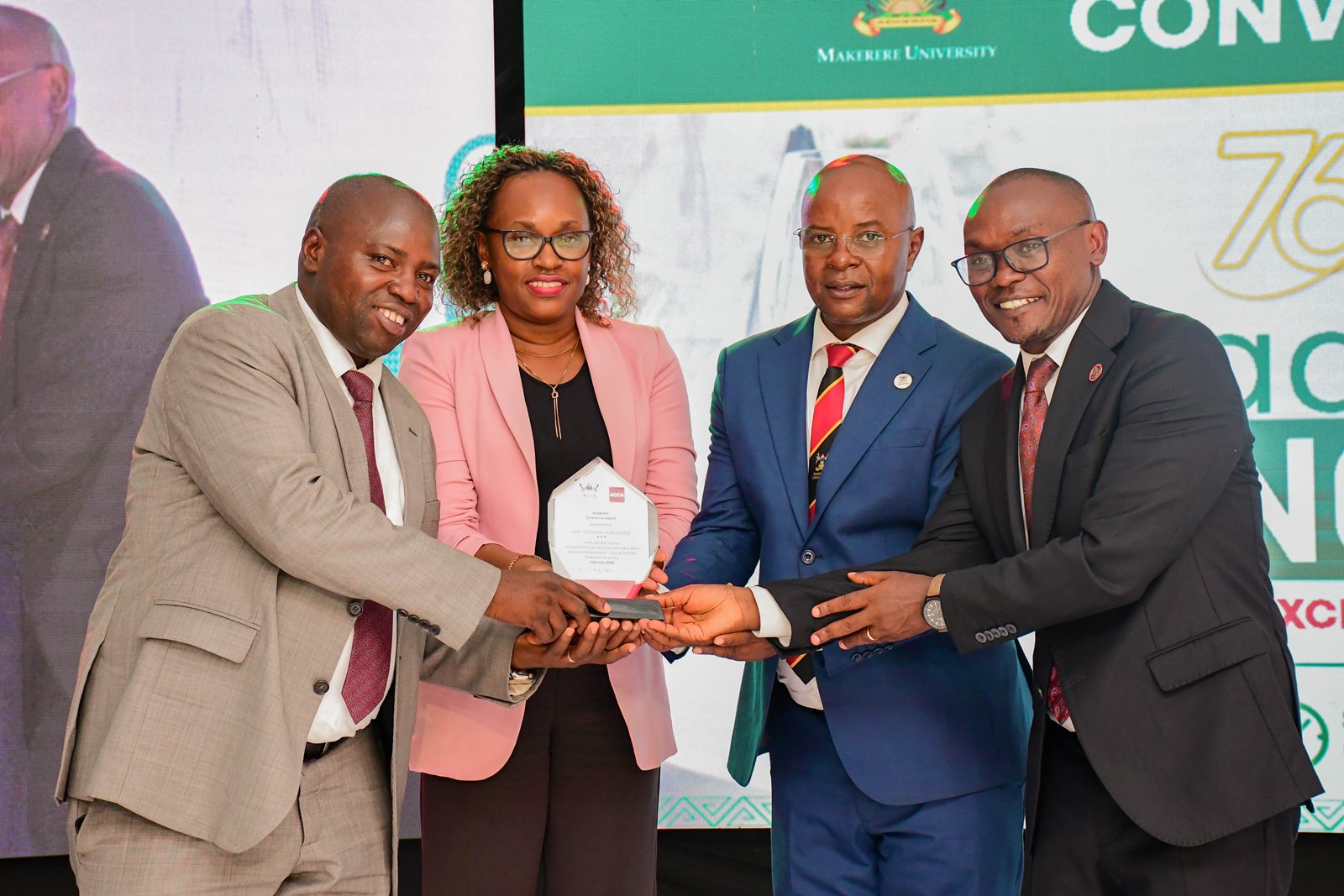
Prudential Uganda-Actuarial Science Award
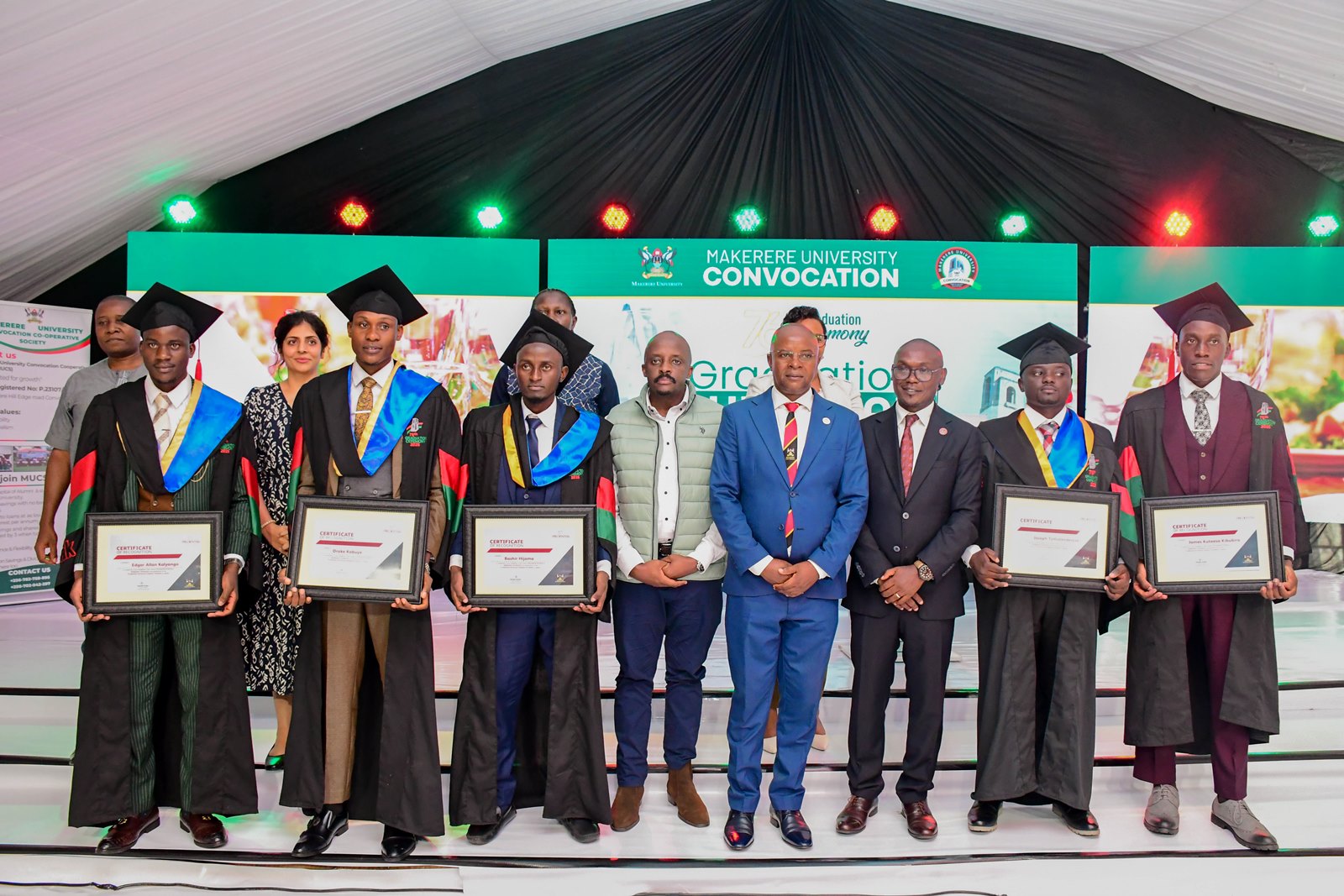
Celebrating academic excellence, Prudential Uganda recognized the fourth cohort of outstanding actuarial science graduates under the Prudential Actuarial Science Support Scheme (PASS). The initiative reflects Prudential’s long-term commitment to building local actuarial expertise and strengthening Uganda’s financial services sector for generations to come.
The top five graduates of Bachelor of Science in Actuarial Science who received the PASS awards included: Drake Kabuye, Edgar Allan Kalyango, Kuteesa Kikubira James, Tumutendereze Joseph, and Bashir Hijoma. These were honored for their outstanding academic performance and commitment to actuarial career. Through PASS, Prudential Uganda provides high-potential graduates with mentorship, internship opportunities, and guidance toward globally recognized actuarial qualifications.
Commenting on the milestone, Tetteh Ayitevie, CEO of Prudential Uganda, said that investing in actuarial talent is critical to building a resilient and sustainable financial services industry. He noted that actuaries play a central role in risk management, pricing, product development, and long-term financial planning, making their contribution vital to the growth of Uganda’s insurance sector.
Prof. Edward Bbaale, the Principal, College of Business and Management Sciences, applauded Prudential Uganda for its ongoing support, highlighting that programmes such as PASS inspire students to excel academically while preparing them for the realities and demands of the actuarial profession.
EPRC Young Professional Award
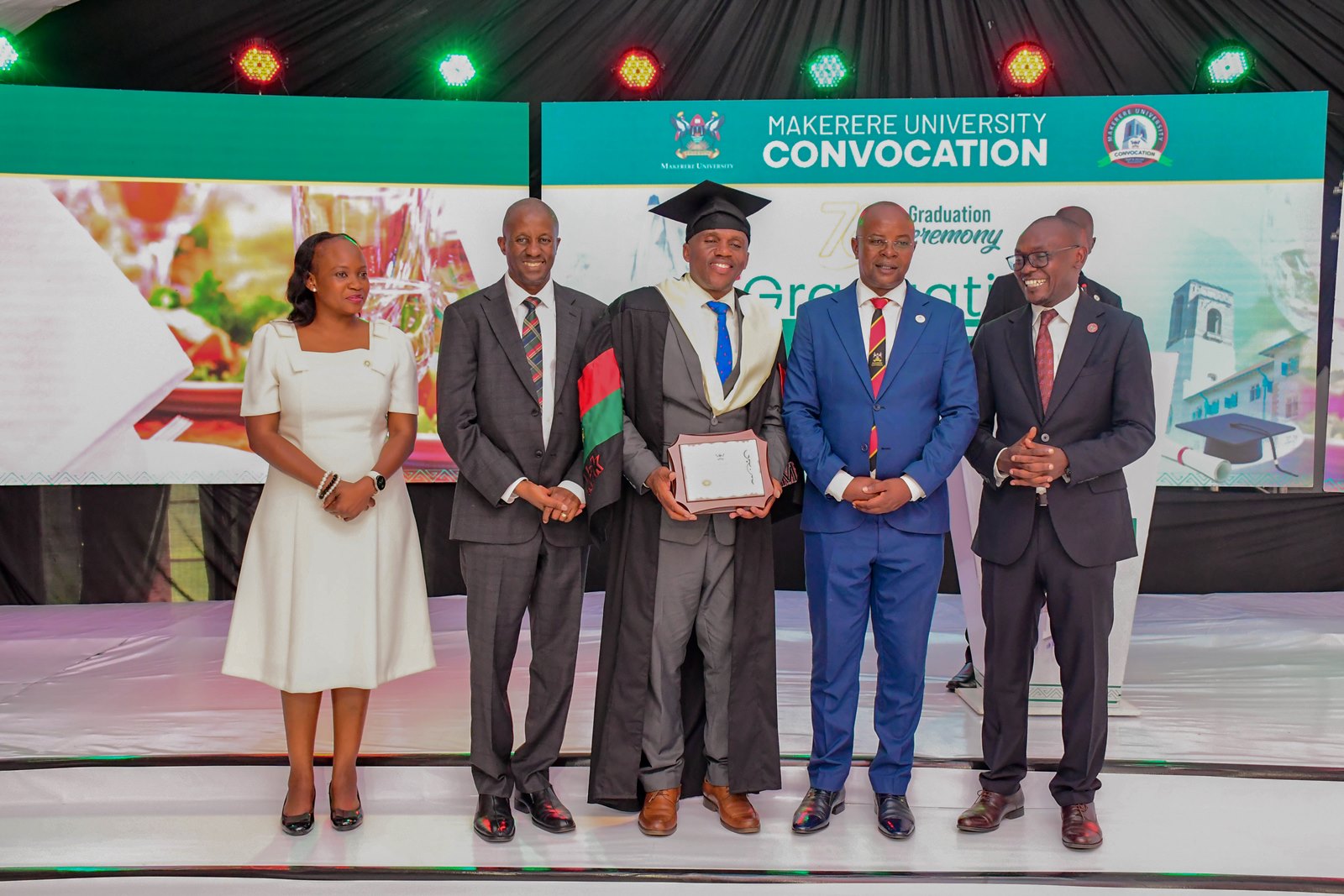
Recognizing excellence, EPRC presented the Young Professional award to Emmanuel Menya, the best Master of Arts in Economics graduate. The award includes a two-year employment contract. Ibrahim Kasirye, the Director of Research at EPRC presented the award on behalf of Dr. Sarah Ssewanyana, the Executive Director.
The EPRC Young Professional Award, recognizes and celebrates exemplary performance. The award underscores the importance of nurturing young professionals who exhibit excellence, innovation, and a strong commitment to national development.
Significance of the Award ceremony
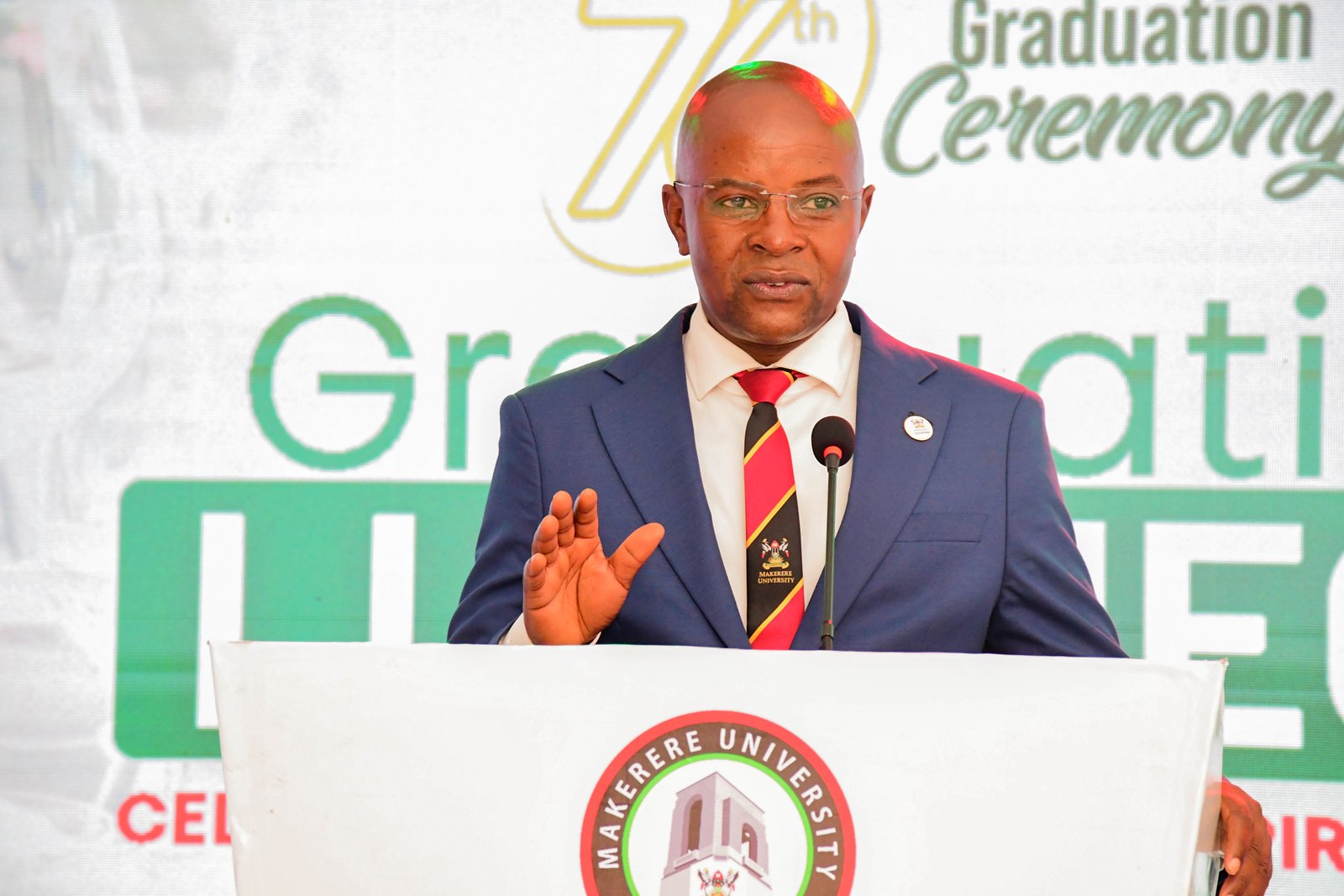
Prof. Edward Bbaale, Principal of College of Business and Management Sciences (CoBAMS), underscored the significance of the ceremony, noting that it served three key purposes: to recognize academic excellence among students, to honor faculty members excelling in teaching, research, and service, and to celebrate Prof. John Ddumba-Ssentamu, former Vice-Chancellor of Makerere University, for his continued contribution to scholarship through authorship.
Prof. Bbaale described Prof. Ddumba-Ssentamu’s ongoing scholarly work as inspirational, stating that it demonstrates a steadfast commitment to knowledge creation beyond leadership roles. He commended both students and staff for their hard work and discipline, emphasizing that university success is a shared achievement.
Collaboration, Responsibility, and Excellence
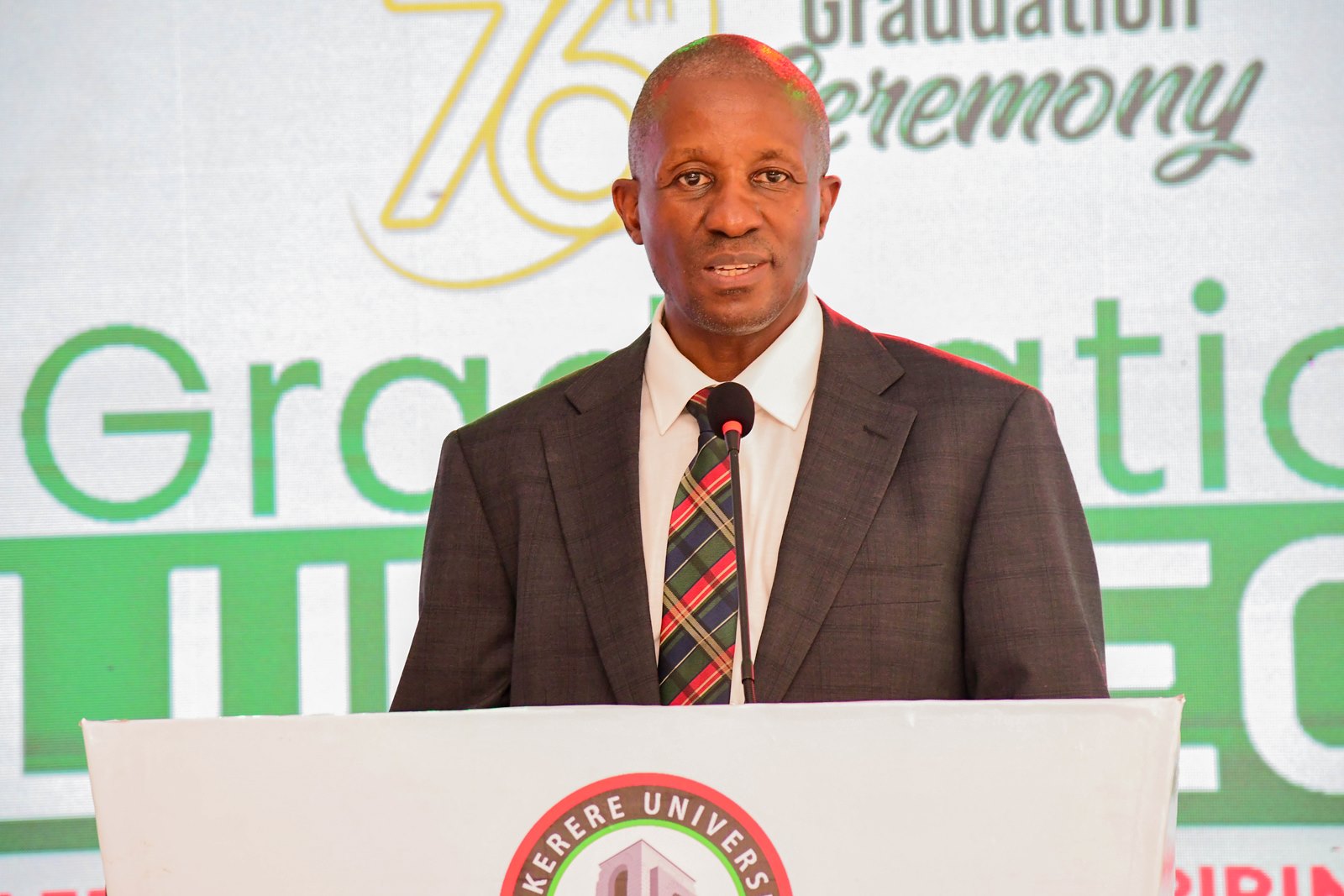
Congratulating the awardees, the Principal of Makerere University Business School (MUBS), Prof. Moses Muhwezi, reminded graduates that being a product of Makerere University is both a privilege and a responsibility.
“Uphold the university’s internationally respected brand, defend it, and take pride in it, while maintaining unity and avoiding internal conflicts that could harm its reputation,” he urged. The Principal of MUBS encouraged graduates to remain committed, diligent, and focused in their pursuit of excellence.
Highlights about Makerere University Convocation
CPA George Mugabi Turyamureeba, Chairperson of the Makerere University Convocation, informed the audience, that the Convocation is a legally established and influential platform for alumni and staff.
Rallying alumni and staff to join Makerere University Convocation, CPA Turyamureeba outlined the achievements and ongoing activities. He reported that during his tenure, the Convocation Executive, had expanded and beautified the permanent home for the Convocation. Some of the ongoing activities include: strengthening alumni engagement, introduction of a cross-generational mentorship program, and the formation of a cooperative society (SACCO) aimed at providing affordable loans and potentially establishing a bank.
He tipped the fresh graduates on resilience, continuous self-improvement, and lifelong learning, stressing the importance of staying connected to their alma mater and the Makerere University Convocation community.
He cautioned the graduates on emerging fraud risks, including digital scams, and fraudulent job offers. He urged them to safeguard their personal information, uphold integrity, and avoid becoming either victims or perpetrators of fraud.
Trending
-

 Humanities & Social Sciences1 week ago
Humanities & Social Sciences1 week agoMeet Najjuka Whitney, The Girl Who Missed Law and Found Her Voice
-

 General1 week ago
General1 week ago76th Graduation Highlights
-

 Agriculture & Environment2 weeks ago
Agriculture & Environment2 weeks agoUganda Martyrs Namugongo Students Turn Organic Waste into Soap in an Innovative School Project on Sustainable Waste Management
-

 Health2 weeks ago
Health2 weeks agoMakerere University School of Public Health Graduates First Cohort of Cost-Effectiveness Analysis Short Course
-

 Agriculture & Environment1 week ago
Agriculture & Environment1 week agoCAES Presents Overall Best Performing Student in the Sciences & a Record 28 PhDs at the 76th Graduation Ceremony
